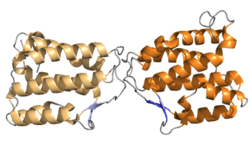Interleukin 34
Interleukin 34 (IL-34) is a protein belonging to a group of cytokines called interleukins. It was originally identified in humans, by large scale screening of secreted proteins; chimpanzee, murine, rat and chicken interleukin 34 orthologs have also been found. The protein is composed of 241 amino acids, 39 kilodaltons in mass, and forms homodimers. IL-34 increases growth or survival of immune cells known as monocytes; it elicits its activity by binding the Colony stimulating factor 1 receptor.
Messenger RNA (mRNA) expression of human IL-34 is most abundant in spleen but occurs in several other tissues: thymus, liver, small intestine, colon, prostate gland, lung, heart, brain, kidney, testes, and ovary. The discovery of IL-34 protein in the red pulp of the spleen suggests involvement in growth and development of myeloid cells, consistent with its activity on monocytes. [5]
References
- GRCh38: Ensembl release 89: ENSG00000157368 - Ensembl, May 2017
- GRCm38: Ensembl release 89: ENSMUSG00000031750 - Ensembl, May 2017
- "Human PubMed Reference:". National Center for Biotechnology Information, U.S. National Library of Medicine.
- "Mouse PubMed Reference:". National Center for Biotechnology Information, U.S. National Library of Medicine.
- Lin H, Lee E, Hestir K, et al. (May 2008). "Discovery of a cytokine and its receptor by functional screening of the extracellular proteome". Science. 320 (5877): 807–11. doi:10.1126/science.1154370. PMID 18467591.
External links
- Overview of all the structural information available in the PDB for UniProt: Q6ZMJ4 (Human Interleukin-34) at the PDBe-KB.
- Overview of all the structural information available in the PDB for UniProt: Q8R1R4 (Mouse Interleukin-34) at the PDBe-KB.
Interleukin-34 at the US National Library of Medicine Medical Subject Headings (MeSH)




